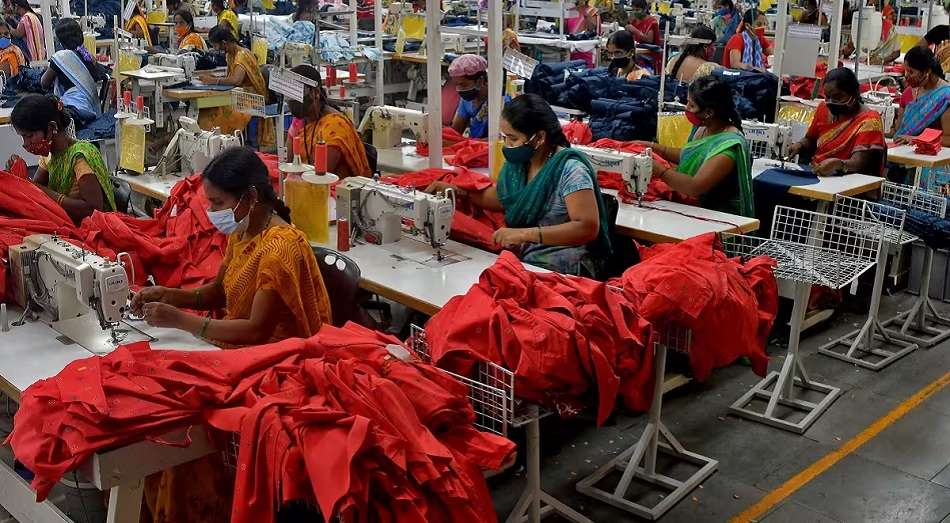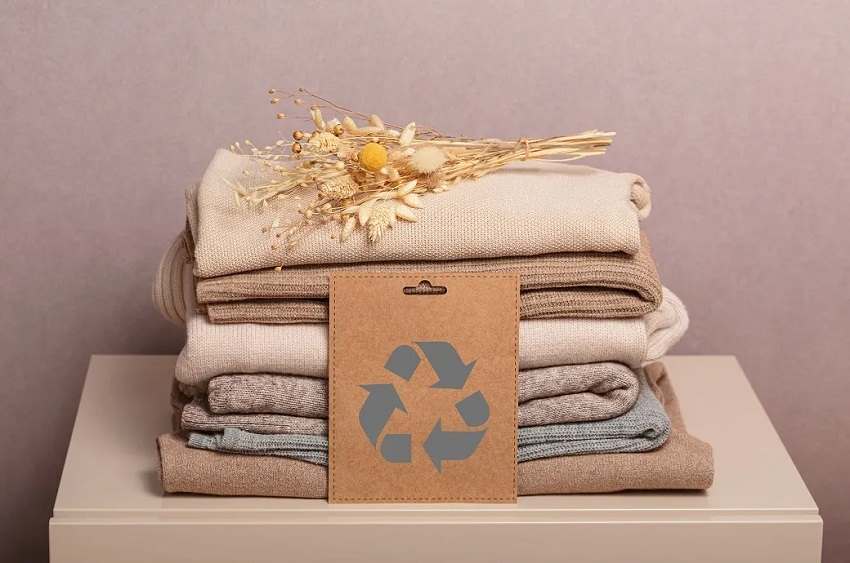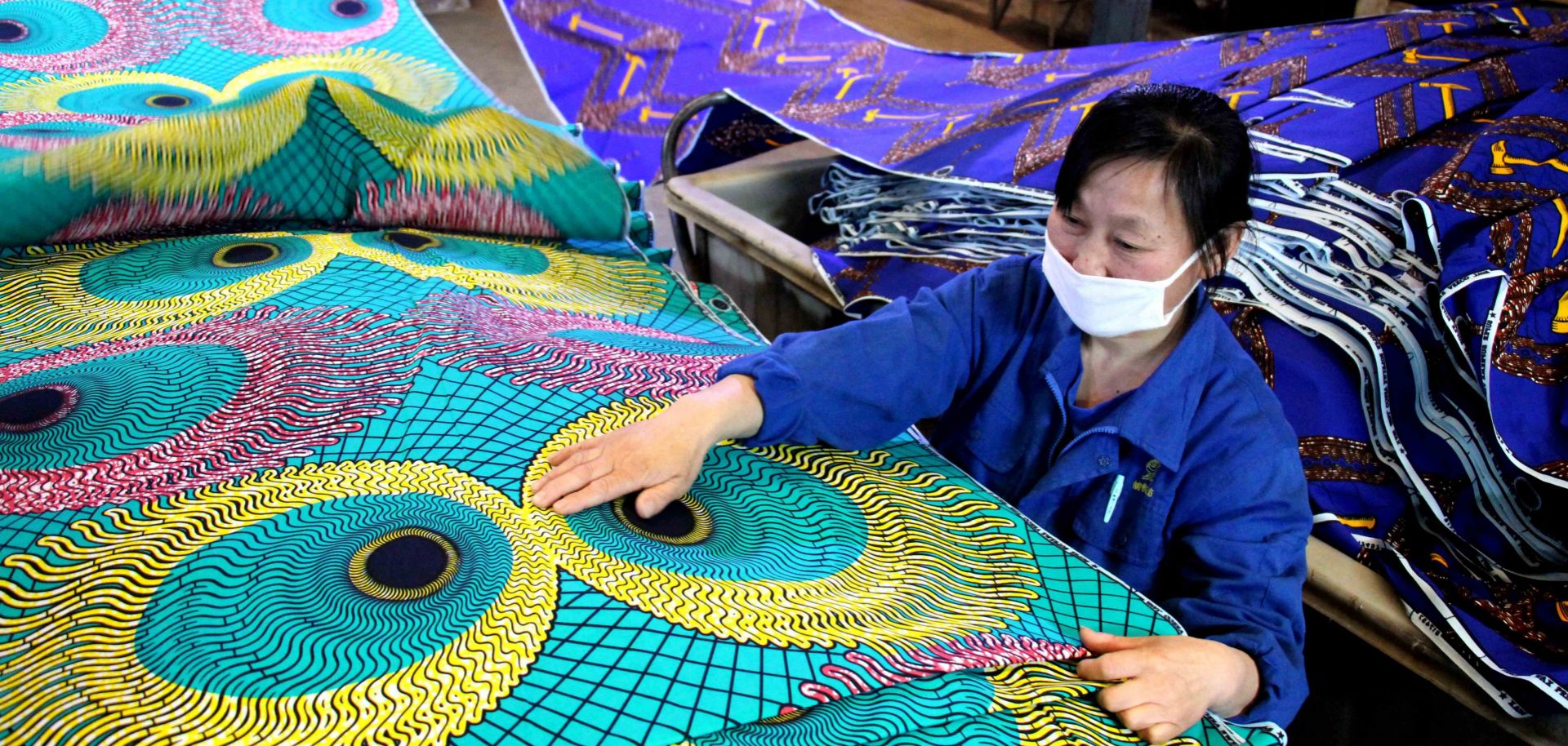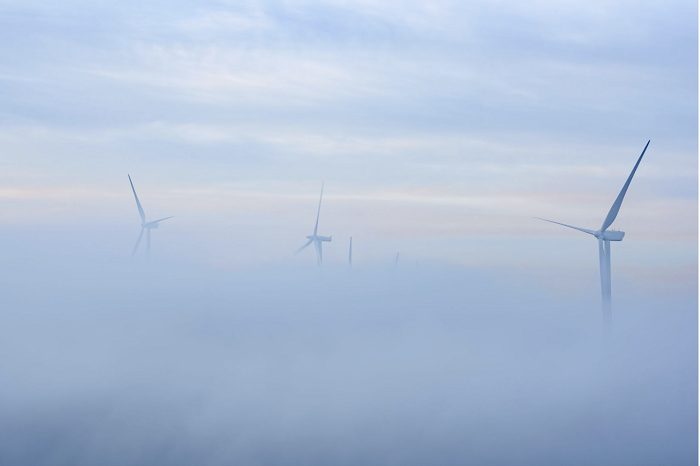Krishna district in coastal Andhra Pradesh has emerged as a textile hub. In the last few years, a dozen companies have already made investments of about Rs 415 crores. More projects are in the offing. One reason is the proximity of the district to Guntur, which is a major source of raw material.
Krishna district is home to block printed cotton textiles called pedana kalamkari. The district is naturally divided into upland and delta areas and the upland areas are the favorite of textile companies. As on date, the largest investment made by any textile company in the district is that of NSL Textiles. The company has invested about Rs 120 crores in its state-of-the-art spinning mill at Veeravalli in Bapulapadu mandal and there are at least 10 other industries with an average investment of nearly Rs 35 crores but none of them is in the delta areas.
Krishna district is fast turning into a hub of cotton apparel and textile value-addition activity with fabric coming from several weavers throughout the country. At Pedana in the district skilled weavers and artisans have moved away from kalamkari work as they do not have money to invest for buying cloth.
A textile park has been allotted to Hinganghat city in Wardha district of Maharashtra. It is being set up in region which has ample cotton, polyester and other raw materials so as to ensure a win-win situation for entrepreneurs and farmers. The park will be developed in 32 acres with an estimated investment of Rs 308 crores and an employment generation capability of around 1,200 people.
The park is being promoted by Gimatex, Bhagirath, Anoop Textiles, Elecon, Toto Toya and others who have come together to form a Special Purpose Vehicle (SPV). Three major textile groups have already been operating in Hinganghat for more than 100 years. Hence this region’s workforce has a textile skill set available for new units. The new investments in cotton downstream processing are expected to ensure that farmers in the region get the best price for their cotton produce.
The park scheme is promoted on the lines of an integrated and cluster approach. Around 20 parks have been approved under the new scheme, with around four in the state of Maharashtra. This scheme has recently been modified to ensure strict compliance to project execution and to promote new investments in textiles by first time entrepreneurs.
Lakshmi Machine Works' (LMW) net profit rose 25.23 per cent on a 0.64 per cent rise in total income in the fourth quarter of March 2015 over the fourth quarter of March 2014. The board has recommended a dividend of Rs 37.50 per share for the year ended March 31, 2015.
LMW was founded in 1962. It is a global player and one among the three manufacturers of the entire range of textile spinning machinery from blow room to ring spinning. The company diversified into CNC machine tools and is a brand leader in manufacturing customised products.
It has a 60 per cent market share in the domestic textile spinning machinery industry. The aim is to deliver greater value to customers by providing complete competitive solutions through technological leadership and manufacturing excellence. LMW’s global presence has grown over the years, with a market presence not only in developing countries, but also in Europe. It has won the top export award in textile machine exports for the past several years.
The foundry makes precision castings for industries the world over. Lakshmi has added the advanced technology center to produce components for the aerospace industry.
www.lakshmimach.com/
Pakistan, has committed to import more than 0.3 million bales of cotton from the US during 2014-15 fiscal year. Pakistan is the eighth largest US cotton importer with import commitments of 3,35,000 bales in the current fiscal year. The country imported 1,69,000 bales of cotton from the US in the previous fiscal year.
US cotton is supposed to be of superior quality. Some Pakistani companies visited the US early recently to observe cotton production, processing and marketing and to meet with US cotton exporters. Pakistan imports high quality cotton from the US and other countries to meet the requirements of its textile industry. Local demand outstrips production and the demand-supply gap has to be filled through imports.
Pakistan’s cotton production during the 2013-14 period declined 9.2 per cent against the target and two per cent over last year’s production. The decrease was due to fall in acreage. Cotton output is estimated to be around 14.94 million bales this year. The country is expected to import around two million bales during 2015-16.
Cotton, has a share of 1.4 per cent in national GDP and 6.7 per cent in agriculture value addition.
Two giants in dyeing textile, DyStar® Group and DyeCoo® Textile Systems, are collaborating to develop products using DyeCoo’s breakthrough technology of substituting carbon dioxide (CO₂) for water in the dyeing process. Both these companies are dedicated advocators for sustainability and are aligned in the vision to reduce the textile industry’s future environmental impact.
DyeCoo® Textile Systems is the world’s first supplier of industrial CO₂ dyeing equipment, which uses recycled CO₂ gas instead of water to permeate textiles with dyes while DyStar® Group is a solution provider, offering customers across the globe a complete range of colorants, auxiliaries and services.
This technology offers a huge potential to save water and energy, both of which are top priorities for the textile dyers. DyStar fully commits to this project to offer the highest sustainable solutions for the textile industry.
Mats Blacker, CEO DyeCoo, said that they were very pleased with DyStar’s dedication to support their water and chemical free dyeing technology. Collaborations like this one are key to further help in ground breaking technology towards global implementation. Seeing that the textile industry is growing exponentially, making tangible sustainable and economical viable improvements a reality are not only vital for our planet, but also for the future of the entire industry. We strive to deliver commercially viable solutions for the textile industry while continuing to develop breakthrough technologies. Companies like DyStar help us to achieve those goals, he added.
Farmers in India may plant fewer acres of cotton as falling demand from China cuts exports to the lowest level in six years. The area is set to drop as much as 10 per cent in the 12 months starting October 1. A smaller harvest in India, the largest exporter after the US, would ease a global surplus that sent New York prices to a five-year low in January. Exports from India will probably drop to seven million bales in the 12 months ending September from 11.79 million bales a year earlier. That would be the lowest since 2008-2009.
China, the world’s biggest buyer, is importing less of the fiber. That will contribute to a 41 per cent drop in Indian shipments this year. Because of lower prices many farmers in India are thinking of growing less cotton. Farmers worldwide will cut planting by about seven per cent this year, leading to a nine per cent decline in output to 23.9 million tons in the 12 months starting August 1.
Futures in Mumbai rallied seven per cent in April, the biggest monthly advance since December 2013, and they advanced 7.6 per cent in New York. Planting will gather pace with the monsoon rains in June.
Tanzania is perhaps best known as one of Africa's major cotton producers, with average crop yield for the past three years reaching 2,75,700 tons of seed cotton. Of this around 70 per cent is exported as lint after being semi-processed. But the country also has a long history in garment and textile production going back as far as 1966.
There are currently around 16 or 17 big factories in Tanzania, of which four or five export outside the East African Community. Two are just offshore stitching enterprises. Tanzania aims to be an origin for making garments with the potential to integrate knitting, weaving and spinning. The country has benefits like reasonable labor costs, large quantities of locally available cotton and yarn, an infrastructure, unrivalled market access and political stability.
Like many sub-Saharan African countries, Tanzania's garment exports to the US enjoy duty-free access. The country has similar access to European Union markets. Currently, 68 per cent of apparel exports from Tanzania to the US are synthetic knit shirts for men and boys.
By focusing on building a new mass stitching industry, Tanzania can start with a clean industry without built-in compliance issues and can leapfrog several stages of development.
In a major setback to Bangladesh's textile chemical exports to Pakistan, National Tariff Commission (NTC) of Pakistan is planning to impose anti-dumping duty on import of hydrogen peroxide from Bangladesh. The NTC has already issued a notice of initiation and invited the interested parties to attend hearing on the issue. Dumping occurs when a company exports a product to any country at prices lower than the normal value (the domestic price or the cost of production) of the product on its domestic market.
On behalf of the Bangladesh government and exporters, Bangladesh Tariff Commission (BTC) will become parties in the hearing and fight against the allegation of dumping the product as the allegation is not true, say commerce ministry of Bangladesh.
As per World Trade Organisation, the importing country can impose anti-dumping duty on import of the product if it finds proof on investigation that dumping has occurred, such dumping has caused or is causing material injury to the domestic industry and there is a causal link between the dumping and the injury found. Anti-dumping duty cannot be imposed if the conditions are not met.
Hydrogen peroxide is used in bleaching and sterilising process in textile and paper and pulp industry. It is also used in bleaching, oxidizing, detoxifying and deodorising purposes. Pakistan is the second largest importer of the product from Bangladesh importing $1.2 million worth. Bangladesh in July-April of the current fiscal year 2014-15 exported the product worth $6.5 million in different countries including Pakistan, India, Malaysia, Sri Lanka and Nepal.
There is a difference of opinion between the State Bank of Pakistan and the textile industry on what ails textile exports. The bank feels structural issues are the primary cause behind weak textile exports rather than energy constraints. It says there has been a decline in export of cotton yarn and fabrics and this has more than offset the increase in export of knitwear, woven garments and towels.
The central bank says textile exports posted a 0.4 per cent decline in the first half of FY 2015 as compared to the same period last year and this decline comes primarily from low value-added items. However, Pakistan’s textile manufacturers say energy constraints and security risks are the prime factors that have badly affected the textile sector’s performance. They say there is no supportive textile policy and due to unfriendly tax structures there is no incentive for industrialists to upgrade their textile units as per global standards.
Textile units want the duty structure to be relaxed so that manufacturers can import latest machinery and make full use of GSP Plus status benefits and export value-added items like knitwear and readymade garments to the European Union.
The Maharashtra Pollution Control Board (MPCB) has proposed closure directives against the Metro Hi-tech Cooperative Textile Park at Maharashtra Industrial Development Corporation (MIDC), Kolhapur, after it found gross irregularities in the way the firm treats effluents. MIDC is one of the newest industrial parks in the district, set up for attracting more business activities.
MPCB had received a complaint a week ago from a local village near the park alleging that the industry was releasing untreated effluents into canals connecting the Doodhganga river. The river is a tributary of the Krishna river, which enters Karnataka. The sewage treatment plant set up by the park was found to be not working for a long period. The machinery was found lying idle.
The same effluents are released into a pond near Doodhganga canal with a depth of around 40 feet. Samples of the incoming effluents in the sewage plant and the ones released in the pond have been collected and are being examined. The park will be given a notice of 48 to 72 hours, after which its water and electricity supply will be stopped. The notice will be issued to the regional office of MIDC, which is the facilitating agency of the state for industries.
MPCB’s directives will be implemented by the MIDC and the power distribution utility at the district level.
- 1
- 2
- 3
- 4
- 5
- 6
- 7
- 8
- 9
- 10
India’s textile and apparel industry sees mixed fortunes in FY25: Wazir Indices
India’s textile and apparel sector showed mixed results in FY25, with growth momentum visible in sales but profit metrics showing... Read more
UK charts course for circular fashion leadership with new CFIN roadmap
A new landmark report released by the Circular Fashion Innovation Network (CFIN) outlines major strides and a comprehensive roadmap for... Read more
The Unseen Cost of Fashion Returns: Undermining sustainability efforts
Fashion brands are increasingly vocal about their commitment to sustainability, proudly unveiling initiatives centered on recycled polyester, reduced water consumption... Read more
China's Luxury Crossroads: Consolidation or retreat for global giants?
For years, China has been the undisputed El Dorado for global fashion and luxury brands. A growing middle class, with... Read more
Fashion for Good and Arvind unveil Future Forward Factories in India to cut text…
Fashion for Good and Arvind Limited have launched the Future Forward Factories India initiative, a major push to reshape the... Read more
The Scope 3 Challenge: Unpacking the elephant in the emissions room
In the escalating global focus on combating climate change, businesses are under pressure to account for their carbon footprint. While... Read more
Right Size, Right Impact: Personalized fit weaving a sustainable future for fash…
With growing environmental consciousness, the fashion industry, long criticized for its detrimental impact, is looking for new and innovative ways... Read more
From Runway to Retail Shelf: Why fashion needs a dose of FMCG discipline
The fashion industry, often lauded for its artistry and emotional appeal, stands at an intriguing crossroads. While it captivates with... Read more
Global Sourcing Expo spotlights Australia's sustainable fashion growth amid supp…
Australia's demand for sustainable fashion is reaching new heights, driven by increasing consumer awareness and a rising wave of conscious... Read more
Shein’s climate targets validated by SBTi, but doubts persists about green crede…
Fast fashion major Shein has announced a major milestone in its sustainability journey, with its climate targets officially validated by... Read more












